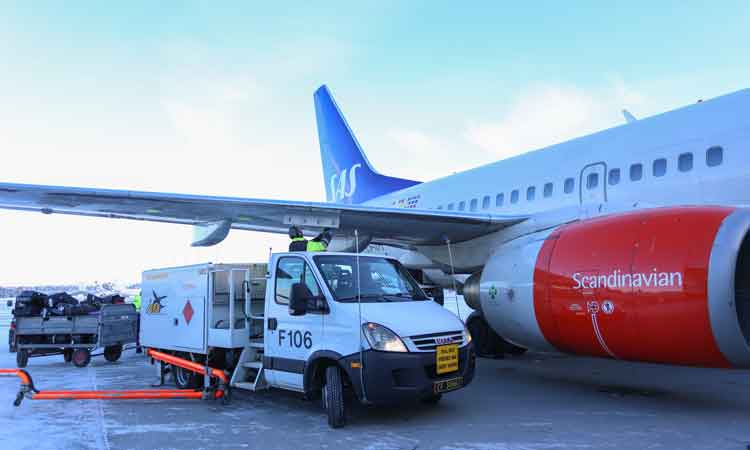Sustainable aviation fuels: experiences from Norway in an early stage of development
By Arvid Løken
8 July 2022
Shares
Arvid Løken, Senior Advisor, Sustainability Department at Avinor, discusses the role of sustainable aviation fuels in decarbonising aviation.


Credit: Avinor
For more than a decade, Avinor has been working together with the Norwegian aviation industry to reduce carbon emissions from aviation. Aviation is a sector that is typically hard to decarbonise. Fuel with high energy density, liquid hydrocarbons, is and will be needed for many years to come.
In a not-too-distant future, short commuter flights can be powered by battery electric solutions, short regional flights by hybrid and hydrogen fuel cell solutions, and intra-European flights by hydrogen. Electrification is a great opportunity for Norway, with a high share of renewable electricity and many routes that have relatively few passengers per flight. Avinor works to support this development. We will prepare our airports for electrified aviation in time for the first flights and we plan to do the same for hydrogen.
It is commonly acknowledged, however, that the aviation industry will depend on sustainable aviation fuels (SAF) to decarbonise. SAF is a turnkey solution. It has been certified for use in civil aviation since 2009 (in blends up to 50 per cent) and when blended can be dropped into the existing infrastructure and hardware and thus can be used on all flights. SAF should arrive blended at the airport to minimise infrastructure requirements.
The main challenge with SAF is that it remains costly, and that production is still at a very low level compared with fossil fuels. Many small and big steps could be taken to address that; more research and development to mature new production technologies, introduction of new types of biomasses and approval of new production pathways; ambitious incentives and policies to promote SAF production and uptake; investments, purchase agreements, communication, nudging, and preparation at different levels. Some projects out there are of global importance whilst others focus on a local feedstock. The impression is that more and more airports, airlines, research organisations and authorities contribute to the development.
Promoting SAF in an early phase Business models vary throughout the world, but except for the fuel infrastructure, European airports typically do not have a formal role in the jet fuel value chain from well to wing. However, there are several actions an airport can take. We observe an increasing number of airports that engage in SAF development in different ways, for example through preparing for supplies of SAF, informing passengers and doing some of the preparatory work for SAF production and uptake in their country or region.
Avinor is continuously exploring what an airport operator could do to enhance SAF production and uptake.
In the beginning it was a prioritised task for Avinor to showcase that SAF could be used just as fossil fuels, that aircraft could use SAF without any adjustments to engines or fuel system and that SAF could be blended into large fuel facilities just like fossil fuel. The first SAF flights in Norway were carried out by SAS and Norwegian Air Shuttle in 2014. In January 2016, Avinor Oslo Airport, in collaboration with AirBP, Lufthansa Group, KLM, SAS, Neste and SkyNRG, became the world’s first international airport to blend biofuel into the regular fuel supply system and to offer biofuels on a commercial basis to all airlines refuelling there. In 2017 and 2018, SAF was also provided at Avinor Bergen Airport.
In 2018, Norwegian authorities were the first in the world to introduce a blending mandate for aviation. From 2020, it has been a requirement that 0.5 per cent of all aviation fuel sold in Norway must be advanced biofuels (except for fuels sold to the Norwegian Armed Forces). The obligation is on the fuel suppliers. A greenhouse gas reduction mandate has later been established in Sweden. Other countries are also discussing similar mandates (blending or GHG reduction). At Avinor, we believe that a real game-changer came in July 2021 when the European Commission in the Refuel EU Aviation initiative proposed an EU wide mandate for SAF, starting at two per cent in 2025 and increasing to 63 per cent in 2050. Such a mandate is addressing both the issue of a level playing field and the great challenge of decarbonising aviation. If anything, close to the proposal is implemented, it will give a strong signal to producers about a large and sharply increasing market.
In Norway, Scandinavian Airlines System (SAS), Norwegian Air Shuttle and Widerøe have set quite ambitious targets for SAF uptake by 2030, and in October 2020 a group consisting of these airlines, the Norwegian Confederation of Trade Unions, the Federation of Norwegian Aviation Industries and Avinor launched a roadmap for Norwegian aviation towards 2050, with the ambition to be fossil-free by 2050. This is a demanding goal that requires close cooperation between the industry and the authorities.
The Norwegian aviation industry is very clear that the biofuel used at Norwegian airports, both diesel for ground vehicles and jet fuel for aircraft, should meet the EU’s sustainability criteria, and that palm oil and palm oil products are unacceptable. Requiring advanced biofuels avoids the challenges of conventional biofuels that conflict with food and feed production and other land use problems. The biomass used will typically be leftovers and by-products from forestry, agricultural production, household waste and the food industry.
SAF looking forward
Greenhouse gas reductions could be implemented at a lower cost in other countries and other sectors. However, Norwegian aviation has taken the Paris Agreement as point of departure and sees great potential both for the aviation sector and for society. Fossil-free aviation will be a key contributor to the connectivity of the future and by being early movers in this field, Norwegian aviation can make an impact on reducing GHG-emissions far beyond our borders.
In autumn 2021, the Norwegian aviation industry launched a programme for increased production and uptake of SAF. With a mandate in place in Norway and an EU wide mandate in pipeline, Avinor’s focus will be on voluntary uptake (on top of the mandate) and on supporting local production and increasing maturity for feedstocks and technologies.
The SAF used today comes from used cooking oil and animal fats. But availability of these feedstocks is limited. New technologies and feedstocks will have to be developed to serve a future market for SAF of a completely different scale. Avinor has been looking into forest-based fuels over several years, and we see a considerable potential for value creation in industry and forestry if we succeed in setting up large-scale SAF production.
So-called e-fuels have gained increasing attention over the later years and are expected to represent close to half the SAF market towards 2050. This is also an interesting opportunity for Norway. In the longer term, technology for harvesting, cultivation and processing can change and open other opportunities such as marine resources.
Different regions of the world will have different comparative advantages to produce SAF. In this respect, a challenging and interesting journey of development and scaling is ahead of us.















